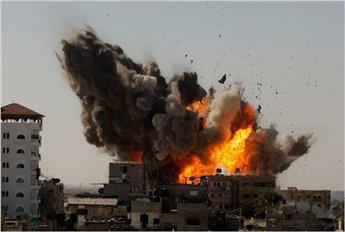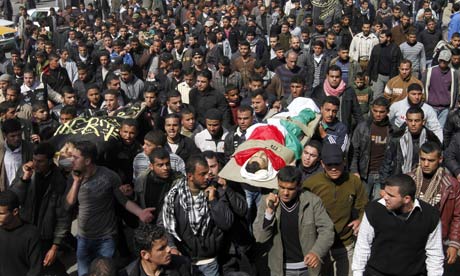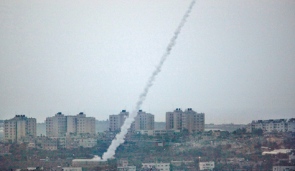 EDITOR: Israel has again taken the course of blood
EDITOR: Israel has again taken the course of blood
Israel has again attacked Gaza, killing 15 Palestinians, including one of the leaders of popular resistance. That Israel can kill many Palestinians, we need no further proof of; That they can seriously speak to them as human beings, we have no proof of. So the killing goes on, and each death takes us further from a just solution. Those who sow the wind, will harvest the storm, for sure.
No, the photograph on the right is NOT an archive photo from Jan 2009. It was taken today in Gaza. That is what Palestinians can expect from Israel, and what they have to suffer constantly! As long as this is the language Israel speaks, and the only language it speaks, there shall be no solution, no peace, no security, no normality in the Middle East. Only Israel can stop this, and we all must force it to do so, through Boycott, Divestment and sanctions, assisting the Palestinian resistance to this barbaric occupation and continuous murder and destruction.
At least 15 killed in Israeli air strikes on Gaza: Guardian
Palestinian militants retaliate with fierce rocket attack on Israel’s southern border communities, seriously wounding one

Israeli air strikes on the Gaza Strip have killed at least 15 people in an escalation of the worst clashes with Palestinian militants so far this year.
The strikes began on Friday, when Israeli air raids killed the senior militant leader Zohair al-Qaisi, the secretary general of the Popular Resistance Committees (PRC). Israel claimed he was targeted because he was planning an attack.
Militants retaliated with a fierce rocket attack on Israel’s southern border communities, which seriously wounded one civilian.
By Saturday, militants had fired 95 rockets at Israel – far more than the total number fired from the beginning of this year, an Israeli military spokesman said. He added that air defence systems intercepted around 25 rockets before they landed.
The Palestinian militants were killed in eight air strikes overnight and on Saturday morning, the Gaza health spokesman, Adham Abu Salmiya, said. He said civilians were also wounded by flying shrapnel.
Tens of thousands of Palestinian mourners marched through the streets in funeral processions following the deaths.
The most recent air strike targeted two Palestinian militants on a motorbike in the border town of Bani Suheila in the south-east of Gaza, Abu Salmiya said. Egypt said it was trying to broker a ceasefire.
Netanyahu: Israel will continue to strike anyone planning to attack its citizens: Haaretz
WATCH: IDF strikes target in Gaza Strip; Since Friday, nearly 100 rockets have been fired at Israel from Gaza; Iron Dome system intercepts 27 of 32 rockets targeted.

Prime Minister Benjamin Netanyahu met with regional council heads in Israel’s south on Saturday, and said Israel will continue to strike whoever plans attacks on Israeli citizens.
The meeting came as the escalation of violence that began on Friday continued on Saturday after several hours of quiet. Five rockets were fired from the Gaza Strip into southern Israel in the early afternoon.
“We will improve the home front defenses even more,” Netanyahu said, “also by purchasing more Iron Dome systems, which proved themselves again this weekend.”
Since Friday, a total of nearly 100 rockets have been fired at Israel from Gaza. During the escalation, the Iron Dome system intercepted 27 of the 32 rockets it targeted. The missile defense system is designed to only intercept rockets identified as heading toward populated areas.
Also on Saturday, Palestinians said that an Israeli air strike killed two people riding on a motorcycle in Gaza’s Khan Younis, bringing the total number of militants reportedly killed to 14.
U.S. Secretary of State Hilary Clinton criticized on Saturday the barrage of rockets fired from Gaza to Israel. Meeting with Kadima chairwoman Tzipi Livni at Newsweek’s annual Women in the World Summit in New York, Clinton added that “Israel has the right to defend itself.” Livni thanked Clinton, saying the international community must act against the terror attacks on civilians in Israel’s south.
Vice Prime Minister Moshe Ya’alon said on Saturday that he hopes “Hamas will quickly come to its senses and stop the violence.” Speaking at a panel in Kfar Saba, Ya’alon added: “It is unacceptable for Israeli citizens to be targeted by this or that organization… Hamas’ ideology is that we should not be here, the rest is tactics.”
On Friday afternoon, the Israel Air Force launched a strike in Gaza and killed the leader of the Popular Resistance Committees, Zuhir al-Qaisi, who was believed to be planning a large terror attack on Israel’s southern border.
Israel launches deadly air strikes on Gaza: BBC
Local men battled to extinguish a large car fire caused by the strike
Israeli air strikes on Gaza have killed at least 12 Palestinians, including a senior militant leader.
Zohair al-Qaisi, secretary general of the Popular Resistance Committees (PRC), was targeted because he was planning an attack, the Israelis said.
Another militant was killed with him. The Islamic Jihad militant group said 10 members of its military wing, the al-Quds Brigades, were also killed.
The Israeli military said dozens of rockets had been fired into Israel.
A spokeswoman said the rocket attacks had injured at least four people, one seriously. Some of the rockets had been intercepted by Israel’s “Iron Dome” anti-missile system, she added.
The rockets were apparently fired in retaliation for the killing of PRC leaders.
Correspondents say it is one of the worst outbreaks of violence along the Gaza border for several months.
Kevin Connolly
BBC Middle East correspondent
There is nothing new in Israel’s use of its air power to target a Palestinian commander in Gaza.
Zohair al-Qaisi only took over as head of the Popular Resistance Committees when his predecessor in the role died in the same manner last August. And he had already survived an unexplained explosion at his family home in Gaza earlier this year in which at least one person died.
This latest air strike may have been a direct response to the firing of two mortar shells from Gaza into Israel a few hours earlier.
But Israel blames Zohair al-Qaisi for a much larger and more significant assault last summer, a wave of gun and bomb attacks in a single day near the country’s southern border with Egypt which left eight Israelis dead.
Ten attackers and five Egyptian soldiers were killed.
The incident was regarded in Israel as an unnerving breach of security, hence the determination to punish those held responsible by the Israeli authorities.
The Israeli strikes mainly took place on Friday, but one militant was killed in a pre-dawn attack on a car on Saturday.
Medical sources say one man was also seriously injured in Friday’s attack on the car carrying Qaisi, near Gaza City.
Witnesses say Israeli drones were heard in the area shortly before the car burst into flames, the Associated Press reports.
The first air strike came a few hours after two mortar shells fired from Gaza landed in Israel without causing injury.
The PRC, which represents a number of armed factions aligned with Hamas, the Islamist movement that runs Gaza, has carried out several rocket and grenade attacks against Israel. It also sometimes operates independently of Hamas.
An Israeli military spokesman said Qaisi was behind a series of gun and bomb attacks near Israel’s border with Egypt last year, in which eight Israelis were killed. Ten of the attackers and five Egyptian soldiers also died.
The spokesman warned Israelis living within range of rockets fired from Gaza to stay indoors overnight.
A spokesman for the PRC in Gaza vowed to take revenge on Israel for the attack.
“All options are open before the fighters to respond to this despicable crime. The assassination of our chief will not end our resistance,” Abu Attiya, a spokesman for the PRC group told Reuters.
The former head of the PRC, Kamal al-Nairab, and its military chief were killed in a similar Israeli attack last year.
Renewed Gaza rocket fire strikes Israel, as escalation in south continues: Haaretz
Several hours of quiet broken by three rockets that exploded in southern Israel; Iron Dome has intercepted 25 of 27 rockets that it has targeted since Friday.
After several hours of quiet on Saturday morning, five rockets were fired from the Gaza Strip into southern Israel in the early afternoon, continuing the escalation of violence that began on Friday.
One of the rockets exploded in an open area near Be’er Sheva. Two fell in the Ramat Eshkol Regional Council, a fourth in the Ashkelon Beach region and a fifth in the Sha’ar Hanegev Regional Council. None caused injuries or damage.
Also on Saturday, Palestinians said that an Israeli air strike killed two people riding on a motorcycle in Gaza’s Khan Younis.
Since Friday, a total of more than 60 rockets have been fired at Israel from Gaza. During the escalation, the Iron Dome system has intercepted 25 of 27 rockets that it has targeted. The Iron Dome is designed to only intercept rockets that are identified as heading toward populated areas.
On Friday, eight people in Israel were wounded by rocket fire and some damage was reported.
On Friday afternoon, the Israel Air Force launched a strike in Gaza and killed the leader of the Popular Resistance Committees, Zuhir al-Qaisi, who was believed to be planning a large terror attack on Israel’s southern border.
Earlier Friday, prior to the IAF’s targeting of al-Qaisi, two mortars were fired into Israel from Gaza.
On Friday night, IAF aircraft struck six targets in Gaza: two weapons manufacturing sites and two rocket launching sites in northern Gaza, a weapons manufacturing site in central Gaza, and a terror activity center in southern Gaza.
Also overnight, the IAF targeted a terrorist in central Gaza and six terrorist cells in northern and central Gaza as they prepared to launch projectiles at Israel, the IDF said.
Palestinian academic Ahmad Qatamesh receives third administrative detention order: Amnesty International on IOA
10 MARCH 2012
By Amnesty International – 6 March 2011
Palestinian academic Ahmad Qatamesh received a new six-month administrative detention order on 1 March. He has been held without charge or trial since 21 April 2011.
Ahmad Qatamesh was given a third administrative detention order on 1 March, the day that his second administrative detention order was due to expire. At the judicial review of the order, which took place on 5 March 2012, the military prosecutor sought the confirmation of the order by the military judge. It is expected that the military judge will confirm the detention order in the coming days.
Ahmad Qatamesh, together with other administrative detainees at Ofer prison in the occupied West Bank, have declared that they do not recognize the legitimacy of the military courts and administrative detention procedures, and have refused to attend judicial hearings. Because the judicial review normally takes place in the presence of the detainee, the prosecution insisted that Ahmad Qatamesh be brought to the court room on 5 March 2012. He again reiterated his rejection of the military court process and immediately returned to his cell.
According to both his wife and his lawyer, Ahmad Qatamesh has been interrogated for no more than a total of 10 minutes by Israel Security Agency (ISA) officers, who alleged that he was a member of the political office of a leftist Palestinian party which has an armed wing: the Popular Front for the Liberation of Palestine (PFLP). While Ahmad Qatamesh was a political and intellectual supporter of the PFLP in the 1990s, he says he has not been involved with them for 13 years. To Amnesty International’s knowledge, he has never been involved with PFLP-affiliated armed groups or advocated violence. His latest work focuses on political solutions that put an end to the violent conflict between Israelis and Palestinians, which he calls a “nightmare”.
It is Amnesty International’s assessment that the reasons for Ahmad Qatamesh’s arrest and continued administrative detention are his peaceful expression, in his writing and teaching, of non-violent political views and the fact that he is considered a mentor for left-wing students and political activists, some of whom may be affiliated to the PFLP. As such, his detention may be part of the Israeli authorities’ strategy to put pressure on the PFLP organisation. Therefore, Amnesty International considers him to be a prisoner of conscience and is calling for his immediate and unconditional release.
Please write immediately in Hebrew or your own language:
*
Expressing concern that Ahmad Qatamesh is a prisoner of conscience, detained solely for the peaceful exercise of his right to freedom of expression, and calling for his immediate and unconditional release;
*
Calling on the authorities to end the use of administrative detention.
PLEASE SEND APPEALS BEFORE 17 APRIL 2012 TO:
Military Judge Advocate General
Major General Avihai Mandelblit
6 David Elazar Street
Hakirya, Tel Aviv, Israel
Fax: +972 3 569 4526
Email: avimn@idf.gov.il
Salutation: Dear Judge Advocate General
Commander of the IDF – West Bank
Major-General Avi Mizrahi
GOC Central Command
Military Post 01149
Battalion 877
Israel Defense Forces, Israel
Fax: +972 2 530 5724
Salutation: Dear Major-General Avi Mizrahi
Deputy Prime Minister and Minister of Defence
Ehud Barak
Ministry of Defence
37 Kaplan Street, Hakirya
Tel Aviv 61909, Israel
Fax: + 972 3 69 16940 / +972 3 691 7915
Salutation: Dear Minister
Also send copies to diplomatic representatives accredited to your country
Please check with your section office if sending appeals after the above date. This is the third update of UA 127/11. Further information: http://amnesty.org/en/library/info/MDE15/031/2011/en
URGENT ACTION
ACADEMIC RECEIVES THIRD DETENTION ORDER
Additional Information
Ahmad Qatamesh is an academic and writer who has previously criticized both the Israeli authorities and the Palestinian Authority. In 1992, he was arrested and held for over a year before being placed under administrative detention after a judge had ordered his release on bail. He reported that he was tortured during his interrogation, and he later documented his experiences in a publication called I shall not wear your tarboosh [fez]. His administrative detention order was renewed repeatedly until he was eventually released on 15 April 1998. During these years, Amnesty International campaigned against his continued detention without charge.
Ahmad Qatamesh was arrested on 21 April 2011 at 2am at the house where he was staying in al-Bireh, in Ramallah in the occupied West Bank. The security forces had first gone to his family’s home to arrest him and, when they did not find him there, broke down the door of the neighbour’s house to search for him. According to his daughter, they then ordered her at gunpoint to telephone him. His wife told Amnesty International that Ahmad Qatamesh gave the security forces directions to reach the house where he was staying so they could arrest him. She said that during the arrest, the security forces made no attempt to search the contents of either their home or the house where they arrested him.
Before he was handed a six-month administrative detention order on 3 May 2011, a military court official told Ahmad Qatamesh’s lawyer that he would be released at 5pm that day, and a prison officer gave him the same message. The order of 3 May seemed to have been produced for another detainee, since Ahmad Qatamesh’s name was written over correction fluid. The order was for an “extension” of administrative detention even though this was Ahmad Qatamesh’s first administrative detention order since the 1990s. His lawyer was subsequently informed that the ISA requested his detention based on undisclosed “evidence” relating to allegations that he is active in the PFLP, which he has consistently denied. As in all administrative detention cases, neither Ahmad Qatamesh nor his lawyer have been allowed to examine or challenge this “evidence”.
On 19 May 2011, the military judge confirmed the detention order, but reduced it to four months. She acknowledged that the original order of 3 May had contained factual errors and had been produced for another detainee and adapted for use in Ahmad Qatamesh’s case. Nonetheless, she concluded that the ISA’s secret evidence against him justified his detention for security reasons. He received a second six-month administrative detention order on 2 September 2011. This was later confirmed by a military judge, and his appeal against the second order was rejected by the Military Court of Appeals.
Administrative detention is an Israeli procedure under which detainees are held without charge or trial for periods of up to six months which are renewable indefinitely. For Palestinians in the occupied West Bank, administrative detention orders are issued by an Israeli military commander based on Military Order 1651. No criminal charges are filed against administrative detainees and there is no intention of bringing them to trial. Detainees are held on the basis of “secret evidence” which the Israeli military authorities claim cannot be revealed for security reasons. Hence the “secret evidence” on which the military authorities base their decision to issue an administrative detention order is not made available to detainees or their lawyers, and detainees cannot challenge the reasons for their detention.
As of 31 January 2012, 309 Palestinians were being held as administrative detainees, according to Israel Prison Service statistics, including 21 Palestinian Legislative Council members.
Name: Ahmad Qatamesh
Gender m/f: male
Further information on UA: 127/11 Index: MDE 15/011/2012 Issue Date: 6 March 2012